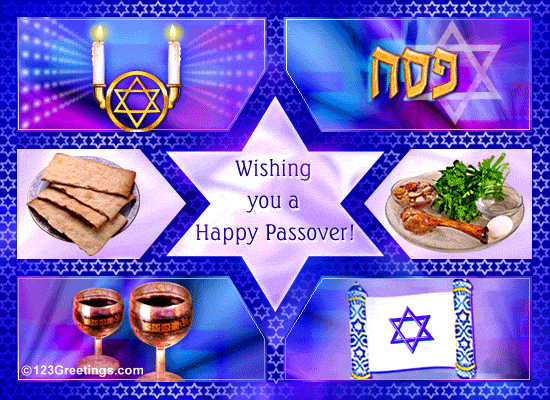This Year Passover Begins Friday April 15, 2022 before Sunset and Ends Saturday April 23rd after Nightfall.
(This Document contains G-d’s Name, therefore it may NOT be thrown out)
For more information go to:
https://www.chabad.org/holidays/passover/default_cdo/aid/109747/jewish/Passover.htm
BEFORE THE HOLIDAY BEGINS:
The mission of the night is to talk about the story of the Exodus with our children and to impress upon them that G-d took us out of Egypt miraculously. This is a biblical commandment!
It would be a good idea to prepare beforehand so that it can be done in exciting and knowledgeable way. Have fun with the story, maybe even buy props and offer prizes and gifts for finding Afikomen and helping with the Seder.
Here is an example: https://www.amazon.com/Passover-Plagues-Puppets-Kit-Create-Children/dp/B007HN678M
It is proper to either throw away all the forbidden food or sell it.
On the evening before Passover, Thursday, April 14th as soon as the sun is down, gather the household together and recite the following blessing: Blessed are You, L-rd our G‑d, King of the universe, who has sanctified us by His commandments, and has commanded us concerning the removal of chametz.
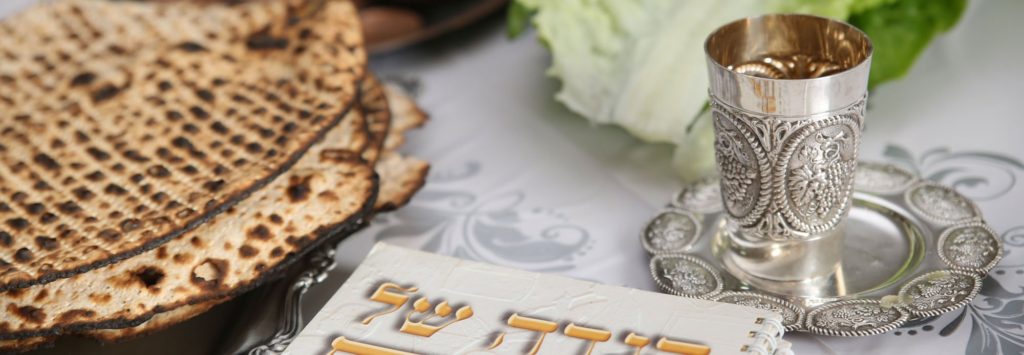
Summary
The Torah instructs a Jew not to eat (or even possess) chometz during Passover. (Exodus 13:3). “Chometz” is defined as any of the five grains (wheat, spelt, barley, oats, and rye) which have been mixed with water and been allowed to rise for at least 18 minutes before being baked.
We are obligated to eat Matzah which is defined as any of the five grains (wheat, spelt, barley, oats, and rye) which have been mixed with a liquid and are baked in an oven within 18 minutes.
We are also not allowed to eat Kitnyot which is rice, corn, soy beans, string beans, peas, lentils, peanuts, mustard, sesame seeds and poppy seeds. (Some Sephardi Jews are more lenient regarding some forms of Kitnyot. Please ask a Rabbi)
I summarized the most important things of the night. I recommend you print out the pages from the link.
For more detailed guide:
https://www.partnersintorah.org/wp-content/uploads/2017/12/passover.pdf
Passover diet begins from April 15th at 10:46 a.m. until April 23rd about an hour after sunset (8:30 Philadelphia time)
Candle Lighting (you can use two tea lights) – for times check –
http://www.chabad.org/calendar/candlelighting.htm
LEAVE A 48 HOUR CANDLES BURNING SO YOU CAN LIGHT FROM THE EXISTING FIRE THE SECOND NIGHT and HOLIDAY CANDLES.
The times below are for Philadelphia area
Friday April 15, 2022 at 7:21 pm.
Saturday April 16 AFTER at 8:22 pm (Light from Existing Fire)
Thursday April 21 at 7:27 pm.
Friday April 22 at 7:28 pm. (Light from Existing Fire)
On Friday, April 15th – light the candles, cover your eyes and say:
BARUKH ATA ADONAI ELOHEINU, MELEKH HA’OLAM, ASHER KID’SHANU B’MITZVOTAV V’TZIVANU L’HADLIK NER SHEL SHABBAT V YOM-TOV
(Blessed are You, L‑rd our G‑d, King of the universe, who has sanctified us with His commandments, and commanded us to kindle Shabath and Holiday.)
BARUKH ATA ADONAI ELOHEINU, MELEKH HA’OLAM, SHEHECHEYANU VEKIYMANU VEHIGI’ANU LAZMAN HAZEH.
(Blessed are You, L‑rd our G‑d, King of the universe, who has granted us life, sustained us, and enabled us to reach this occasion.)
On Saturday, April 16th Light the candles, cover your eyes and say:
BARUKH ATA ADONAI ELOHEINU, MELEKH HA’OLAM, ASHER KID’SHANU B’MITZVOTAV V’TZIVANU L’HADLIK NER SHEL YOM-TOV
(Blessed are You, L‑rd our G‑d, King of the universe, who has sanctified us with His commandments, and commanded us to kindle Yom Tov light.)
BARUKH ATA ADONAI ELOHEINU, MELEKH HA’OLAM, SHEHECHEYANU VEKIYMANU VEHIGI’ANU LAZMAN HAZEH.
(Blessed are You, L‑rd our G‑d, King of the universe, who has granted us life, sustained us, and enabled us to reach this occasion.)
On Thursday, April 21st Light the candles, cover your eyes and say:
BARUKH ATA ADONAI ELOHEINU, MELEKH HA’OLAM, ASHER KID’SHANU B’MITZVOTAV V’TZIVANU L’HADLIK NER SHEL YOM-TOV
(Blessed are You, L‑rd our G‑d, King of the universe, who has sanctified us with His commandments, and commanded us to kindle Yom Tov light.)
On Friday, April 22nd – light the candles, cover your eyes and say:
BARUKH ATA ADONAI ELOHEINU, MELEKH HA’OLAM, ASHER KID’SHANU B’MITZVOTAV V’TZIVANU L’HADLIK NER SHEL SHABBAT V YOM-TOV
(Blessed are You, L‑rd our G‑d, King of the universe, who has sanctified us with His commandments, and commanded us to kindle Shabath and Holiday.)
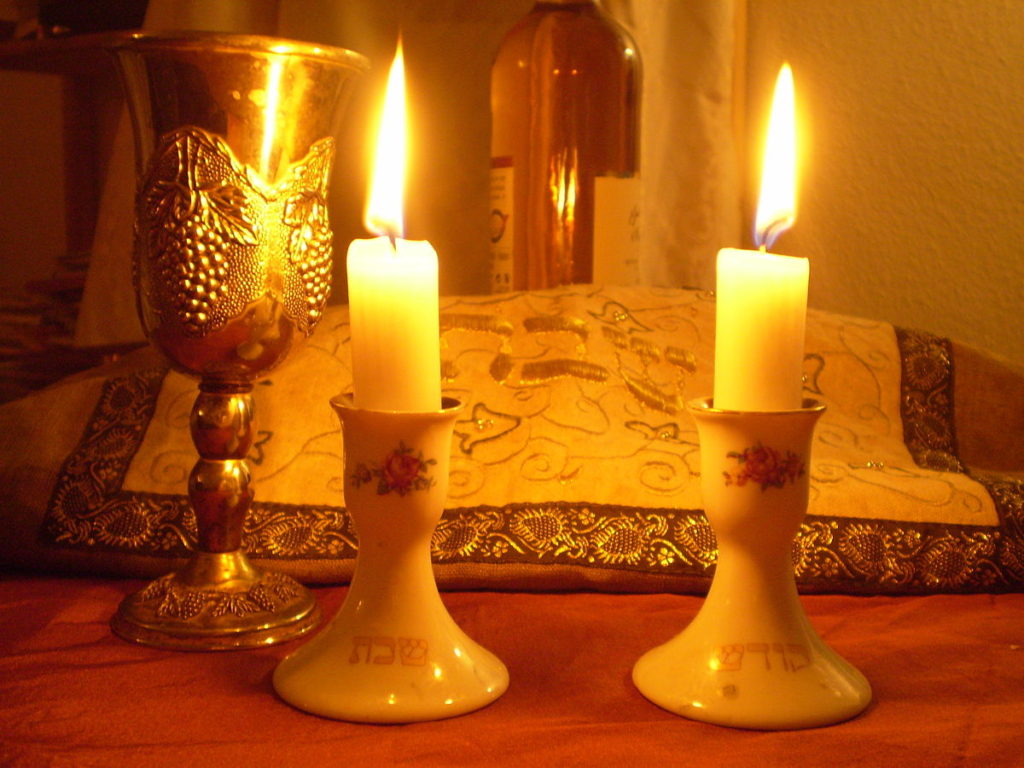
Passover Table setup
Matzah:
The head of the table should have a plate with three (3) complete Matzahs stacked on top of each other.
In addition to the 3 Matzahs for the head of the table, you should have enough Matzah on the table to enable everyone to partake at approximately 2 whole matzah sheets (2/3 of a machine matzah sheet for Motzi Matzah, 1/2 a sheet for Korech and 1/2 a sheet for Afikoman).
Wine:
As you might know we drink 4 cups of wine during the night (best to drink red wine with minimum of 4% alcohol; when one cannot drink wine – red grape juice is sufficient).
These cups represent 4 ways that G-d took us out of Egypt.
1. Hotzeisi – took us out of hard labor
2. Hezalti – saved us out of slavery
3. Goalti – took us out of Egypt
4. Lakahti- Took us as His nation
Amount of wine in each cup should exceed 2.9 fl. oz. (86 cc) and one should drink majority of the cup.
Green (bitter) vegetables for Maror:
It is customary to utilize romaine lettuce leaves as green vegetables / maror. You should have enough lettuce on the table for each participant to partake one large lettuce leaf during Maror.
Green vegetables for Karpas:
A vegetable of your choice (ex. celery or potatoes) cut into small pieces
Salt Water:
When we get to the Karpas step in Seder celebration we dip a vegetable in salt water. Salt water represents the tears of oppression we experienced in Egypt and other challenging periods in our history. The salt water mixture must be prepared in advance.
Haroset:
Haroset is a sweet, dark colored mixture of fruits (usually apples), nuts, cinnamon, red wine and honey. It represents the mortar we used to make bricks in Egypt. There are many variations of haroset in our various traditions where ingredients might include raisins, figs, dates, date honey (silan), exotic spices, etc. Have couple of plates spread on the table it is an important ingredient in the seder and often also an excellent spread on the matzah or desert.
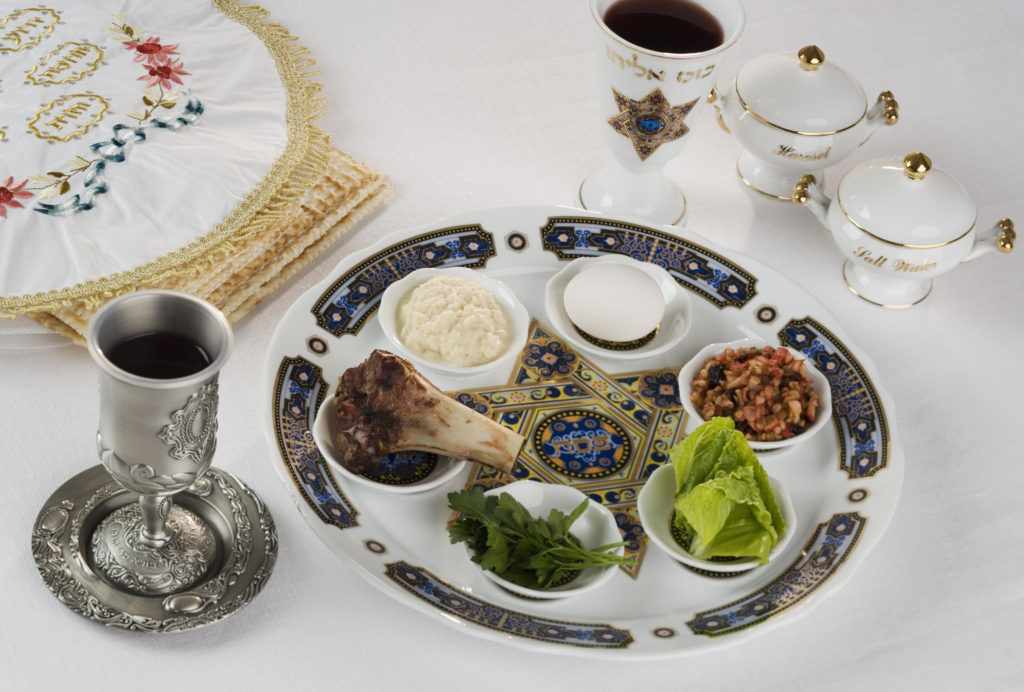
The Seder Plate:
In addition to all Seder “official” foods outlined above one should have a separate plate with the following six ingredients
1. Egg (cooked)
2. Bone (roasted shank bone or chicken drumstick – this )
3. Bitter vegetable (Ex. lettuce)
4. Green Vegetable (Ex. celery, parsley)
5. Haroset (mix of grated apples, nuts and a bit of wine)
6. Horseradish
Of the above 6 ingredients on the seder plate Bone and Egg must not be consumed during the Seder
These are the steps of the nights
1. Kadesh – These are the steps of the nights
Today we are KINGS not slaves.
Say “BARUKH ATA ADONAI ELOHEINU, MELEKH HA’OLAM, BO’RE P’RI HAGAFEN.” And “BARUKH ATA ADONAI ELOHEINU, MELEKH HA’OLAM, SHEHECHEYANU VEKIYMANU VEHIGI’ANU LAZMAN HAZEH.”
Lean to the left and drink a first cup.
Immediately fill the second cup. Many pour this cup right before the mah nishtana
2. Orchats – Wash Hands– (pour water from a cup three times on each hand – start from the right
hand). We do not say a blessing.
3. Carpas – Dip a green vegetable of your choice (Ex. celery) in salt water. (Have in mind you will be eating more vegetables a little later for Maror and this blessing should count for that as well.) Boruch Ata Ado-nai Alo-hainu Meleh Haolom Bore Pre Haadama”
4. Yachats – Break middle Matza into 2 parts (big piece called Afikomen – we wrap in a napkin and hide). It is fun to let kids find it and when they do they get a gift.
Smaller part we put back. Two parts represent redemption (bigger one) in the future. Matza is called (Lechem Oni) – Bread of my affliction, yet Oni also means “to speak” because this MATZA is the central piece of the holiday.
5. Magid
The FOUR questions called Mah Nishtana – (to be asked by the youngest person at the table)
| English | Transliteration |
| Why is this night different from all the other nights; | Mah nishtanah, ha-laylah ha-zeh, mi-kol ha-leylot |
| That on all other nights we eat both chametz and matzah, on this night, we eat only matzah | She-b’khol ha-leylot ‘anu ‘okhlin chameytz u-matzah, ha-laylah ha-zeh, kulo matzah |
| That on all other nights we eat many vegetables, on this night, maror | She-b’khol ha-leylot ‘anu ‘okhlin sh’ar y’rakot, ha-laylah ha-zeh, maror |
| That in all other nights we do not dip vegetables even once, on this night, we dip twice | She-b’khol ha-leylot ‘eyn ‘anu matbilin ‘afilu pa`am ‘achat, ha-laylah ha-zeh, shtey f`amim |
| That in all other nights some eat sitting and others reclining, on this night, we are all reclining | She-b’khol ha-leylot ‘anu ‘okhlin beyn yoshvin u-veyn m’subin, ha-laylah ha-zeh, kulanu m’subin |
(Story) –
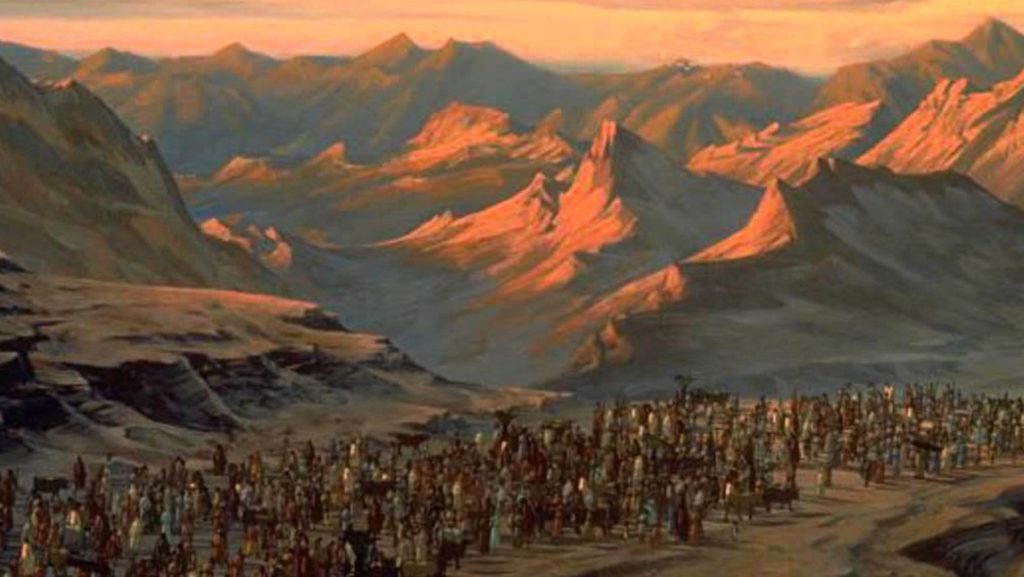
1. We were slaves in Egypt and the Lord freed us from Egypt with a mighty hand. Had not the Holy One liberated our people from Egypt, then we, our children and our children’s children would still be enslaved.
2. We were not born free men and women; we were not born believers in one God. We came from an ancestry of slaves and idol worshippers. Tonight, we celebrate, not our genesis — what we were or what our ancestors were — but what we have become. We are a choosing people, and our choice has come out of tragic encounters with pagan superstition and political enslavement. We are a choosing people and we have discovered the meaning of our choice: to live as witnesses to one God who calls upon us to mend the world, to make whole the broken vessels of this incomplete world.
3. The Torah recounts the early history of the Jewish people. It describes how God commanded Abraham to leave his country and his father’s house and to go to the land of Canaan, where he would become the founder of “a great nation.” Abraham and his wife, Sarah, obeyed God’s command and journeyed to Canaan. There God blessed them and their family. Their son was Isaac, who married Rebecca. Their grandson was Jacob; and it was Jacob who went down to Egypt.
4. Why did Jacob journey to Egypt? Because Joseph, his son by his beloved Rachel, had become prime minister to Pharaoh, king of Egypt. When a famine broke out in Canaan, Joseph asked his father and all his family to join him there. Then Joseph gave his father and his brethren a possession, as Pharaoh commanded. And Israel dwelt in the land of Goshen; and they were fruitful and multiplied exceedingly
5. Joseph died, and all his brethren, and all that generation. Now there arose a new Pharaoh over Egypt, who knew not Joseph. And he said unto his people, “Behold, the people of the children of Israel are too many and too mighty for us; come, let us deal wisely with them, lest they multiply, and it come to pass, that if there be a war, they join themselves unto our enemies and fight against us.” Therefore Pharaoh set over them taskmasters to afflict them with burdens. But the more the Egyptians afflicted them, the more the Israelites multiplied and the more they spread abroad.
6. The cruelest decree of all was the Pharaoh’s order that every baby boy born to an Israelite woman be drowned in the River Nile. One couple, Amram and Yocheved, would not kill their newborn son. Instead, they hid him in their hut for three months. When his cries became too loud, Yocheved placed him in a basket on the river. Their daughter Miriam watched to see what would happen.
7. As the Pharaoh’s daughter came to bathe in the river, she discovered the basket. She felt pity for the helpless child and decided to keep him as her own. She named him Moshe (Moses), which means “drawn from the water.” Bravely, Miriam asked the princess if she needed a nurse to help her with the baby. The princess said yes, and so it happened that Yocheved was able to care for her own son and teach him about his heritage.
8. Moses would have lived at the Pharaoh’s palace forever, but he could not ignore the suffering of his people. Once when he saw an Egyptian beating an Israelite slave, he could not control his anger, and he killed the Egyptian. Knowing his life would be in danger once the news of this deed spread, Moses fled to the land of Midian where he became a shepherd.
9. One day, while tending sheep on Mount Horeb, Moses saw a bush that seemed to be on fire, but was not burning up. From the bush, he heard God’s voice calling him. God said, “I am the God of your ancestors. I have seen the suffering of the Israelites and have heard their cries. I am ready to take them out of Egypt and bring them to a new land, a land flowing with milk and honey.”
10. God told Moses to return to Egypt to bring the message of freedom to the Israelites and to warn Pharaoh that God would bring plagues on the Egyptians if he did not let the slaves go free. Moses was such a humble man that he could not imagine being God’s messenger. “I will be with you,” God promised Moses. With this assurance and challenge, Moses set out for Egypt.
11. When Moses asked Pharaoh to free the Israelites, he refused. It was only then that God brought ten plagues on the Egyptians. Each one frightened Pharaoh, and each time he promised to free the slaves. But when each plague ended, Pharaoh did not keep his word. It was only after the last plague, the death of the firstborn of the Egyptians, that Pharaoh agreed to let the Israelites go. And so it was that God brought us forth out of Egypt, with a mighty hand and with an outstretched arm and with great terror and with signs and with wonders.
12. The experience of the Exodus was transforming; it made us a free people forever. No matter how oppressed we are, deep inside we remain free. We know now that history has meaning. We know that power cannot vanquish freedom forever. We know that God has purposes in human history.
We say “This is the bread of our affliction” – pointing to Matza
The Torah speaks of four types of children: one is wise, one is wicked, one is simple, and one does not know how to ask.
The Wise One asks: “What is the meaning of the laws and traditions God has commanded?” (Deuteronomy6:20) You should teach him all the traditions of Passover, even to the last detail.
The Wicked One asks: “What does this ritual mean to you?” (Exodus 12:26) By using the expression “to you” he excludes himself from his people and denies God. Shake his arrogance and say to him: “It is because of what the Lord did for me when I came out of Egypt…” (Exodus 13:8) “For me” and not for him — for had he been in Egypt, he would not have been freed.
The Simple One asks: “What is all this?” You should tell him: “It was with a mighty hand that the Lord took us out of Egypt, out of the house of bondage.” (Exodus 13:14)
As for the One Who Does Not Know How To Ask, you should open the discussion for him, as it is written: “And you shall explain to your child on that day, ‘It is because of what the Lord did for me when I came out of Egypt.” (Exodus 13:8)
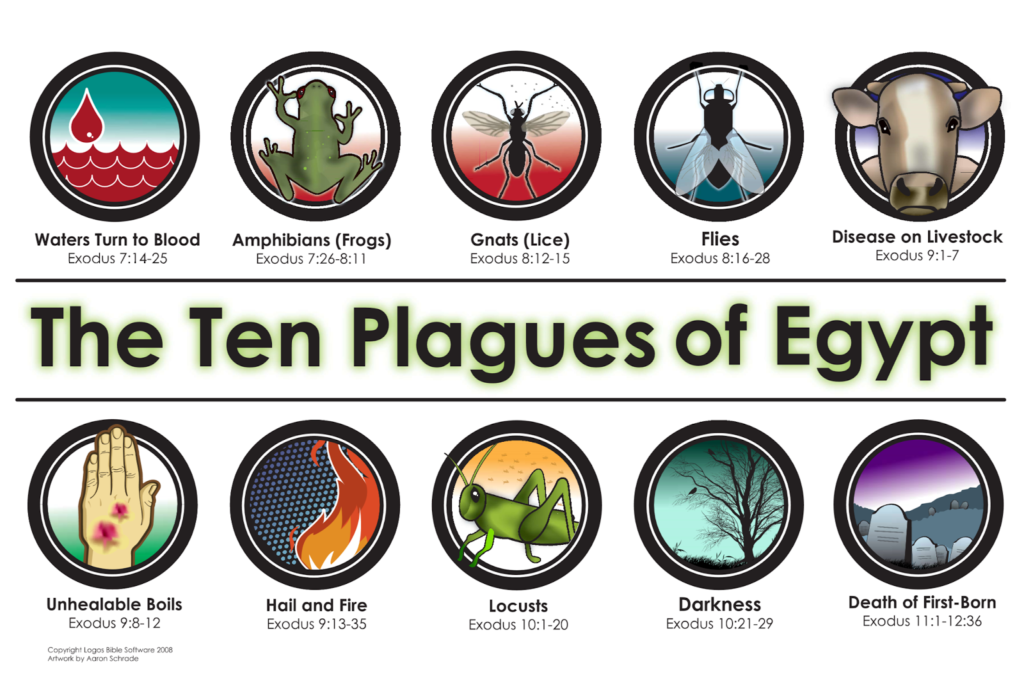
THEN : We say “Blood/Fire/Pillars of Smoke” “Dam/VoAish/Vesimros Ashan”
We take 3 drops out of 2nd cup that we did NOT drink yet.
Blood Represents Plagues
Fire Represent Escape (what separated us from Egyptians going out)
Smoke Represents giving of Torah
NOW we mention 10 plagues (as we mention it – we spill a drop of wine out of 2nd cup for each one – We do it because even though we are thrilled about the plagues that took place that saved us…we are still sad about people (Egyptians) that suffered. We are respectful of all G-ds creations.
- Blood – Dam
- Frogs –Tsifardeya
- Lice- Kenem
- Wild Beasts- Arov
- Death of Animals – Dever
- Boils (Infection of Skin) – Shchin
- Hail- Barad
- Locust – Arbe
- Darkness- Chosheh
- Death of the firstborn – Makas bechoros
Rabbi Yehuda says that we need to make an acronym from 10 plagues (in Hebrew)
First 3 are – Dtsah
Next 3 are – Adash
Last four are -Beahav
We show the order moving to more severe plagues…therefore increasing our belief in G-d.
We sing Dayenu song.
This song states that whatever G-d gave and gives and did and does for us is ENOUGH.
How many are the gifts that God has granted us!
Had God taken us out of Egypt without
bringing judgments against them…Da’yenu!
Had God brought judgments against them
without carrying us across the Sea…Da’yenu!
Had God carried us across the Sea without
caring for us for forty years…Da’yenu!
Had God cared for us for forty years
without giving us the Sabbath…Da’yenu!
Had God given us the Sabbath without the
gift of Torah on Mount Sinai…Da’yenu!
Had God given us the Torah without
bringing us into the land of Israel…Da’yenu!
How many are the gifts that God has granted us!
Ee’lu hotzee, hotzee’anu, hotzee’anu me’mitzraim, da’yenu
Rabbi Gamliah said that saying these 3 things are VERY important:
Point to bone (The Pesach) – this represents Pesach sacrifice.
Point to Matza- this is the Matza that we carried out of Egypt.
Point to horseradish – this represents the bitterness of our lives in Egypt.
Pick up the 2nd cup and say:
“BARUKH ATA ADONAI ELOHEINU, MELEKH HA’OLAM, BO’RE P’RI HAGAFEN.”
Lean to the left and drink.
6. Rochtza – Wash hands (pour water from a cup three times on each hand – start from the right
hand). We say a blessing.
“BARUKH ATA ADONAI ELOHENU, MELEKH HA`OLAM, ASHER KID’SHANU B’MITZVOTAV V’TZIVANU `AL NETILAT YADAYIM.”
”
7. Motzi Matza
Lift 2 and a half Matzas that are in front of us and say
“BARUKH ATA ADONAI ELOHEINU, MELEKH HA’OLAM, HAMOTZI LEHEM MIN HA’ARETZ.”
Return the bottom matzah to the table and while holding the top Matzah and the broken middle Matzah say:
“BARUKH ATA ADONAI ELOHEINU, MELEKH HA’OLAM, ASHER KID’SHANU B’MITZVOTAV V’TZIVANU AL ACHILAT MATZAH.”
Lean to the left as we eat matza.
8. Maror
Take Green bitter vegetables (example: romaine lettuce) or horseradish and dip it in haroset (mix of grated apples, nuts and a bit of wine)
Before eating we say:
“BARUKH ATA ADONAI ELOHEINU, MELEKH HA’OLAM, ASHER KID’SHANU B’MITZVOTAV V’TZIVANU AL ACHILAT MAROR.”
9. Koreh
Make a sandwich with 2 pieces of Matzah and in between place Green Bitter Vegetables (example: romaine lettuce) or horseradish, dip it into Haroset and then wipe the Haroset off. Do not mix anything else into the sandwich.
10. Shulhan Oreh –
Hope you hungry because the Meal is here!
Start the meal with a piece of egg which represents a cycle of life. Meat for this meal should not be roasted (or pot-roasted) or baked. Rather it should be boiled.
11. Tsafun –
At the end of the meal we eat Afikoman that the kids found (see Yachats)
Lean when we eat the Afikoman. It is important to eat at least half a sheet of Matzah. We are not allowed to eat anything after we eat Afikoman.
12.Borech – Fill the 3rd cup say a grace after meal
Blessed are You, L-rd our G-d, King of the universe, who, in His goodness, provides sustenance for the entire world with grace, with kindness, and with mercy. He gives food to all flesh, for His kindness is everlasting. Through His great goodness to us continuously we do not lack [food], and may we never lack food, for the sake of His great Name. For He, benevolent G-d, provides nourishment and sustenance for all, does good to all, and prepares food for all His creatures whom He has created, as it is said: You open Your hand and satisfy the desire of every living thing. Blessed are You, L-rd, who provides food for all.
We offer thanks to You, L-rd our G-d, for having given as a heritage to our ancestors a precious, good and spacious land; for having brought us out, L-rd our G-d, from the land of Egypt, and redeemed us from the house of bondage; for Your covenant which You have sealed in our flesh; for Your Torah which You have taught us; for Your statutes which You have made known to us; for the life, favor, and kindness which You have graciously bestowed upon us; and for the food we eat with which You constantly nourish and sustain us every day, at all times, and at every hour.
For all this, L-rd our G-d, we give thanks to You and bless You. May Your Name be blessed by the mouth of every living being, constantly and forever, as it is written: When you have eaten and are satiated, you shall bless the L-rd your G-d for the good land which He has given you. Blessed are You, L-rd, for the land and for the sustenance.
Have mercy, L-rd our G-d, upon Israel Your people, upon Jerusalem Your city, upon Zion the abode of Your glory, upon the kingship of the house of David Your anointed, and upon the great and holy House over which Your Name was proclaimed. Our G-d, our Father,
| On weekdays: tend us, | On Shabbat and festivals: our Shepherd, |
nourish us, sustain us, feed us, and provide us with plenty; and speedily, L-rd our G-d, grant us relief from all our afflictions. L-rd our G-d, please do not make us dependent upon the gifts of mortal men nor upon their loans, but only upon Your full, open, holy, and generous hand, that we may never be shamed or disgraced.
| On Shabbat: May it please You, L-rd our G-d, to strengthen us through Your mitzvot, and through the mitzvah of the Seventh Day, this great and holy Shabbat. For this day is great and holy before You, to refrain from work and to rest thereon with love, in accordance with the commandment of Your will. In Your good will, L-rd our G-d, bestow upon us tranquility, that there shall be no distress, sadness, or sorrow on the day of our rest. L-rd our G-d, let us see the consolation of Zion Your city, and the rebuilding of Jerusalem Your holy city, for You are the Master of deliverance and the Master of consolation. |
| On Rosh Chodesh, festivals, and Chol Hamoed, add the following. As the leader recites aloud the words Remember…for good life in the following paragraph, the others respond Amen as indicated. Our G-d and G-d of our fathers, may there ascend, come, and reach; be seen, accepted, and heard; recalled and remembered before You the remembrance and recollection of us, the remembrance of our fathers, the remembrance ofMashiach the son of David Your servant, the remembrance of Jerusalem Your holy city, and the remembrance of all Your people the House of Israel, for deliverance, well-being, grace, kindness, mercy, good life, and peace, on this day of On Rosh Chodesh: Rosh Chodesh. On Pesach: the festival of Matzot. On Shavuot: the festival of Shavuot. On Sukkot: the festival of Sukkot. On Rosh Hashanah: the festival of Remembrance. On Shemini Atzeret: the festival of Shemini Atzeret On Rosh Chodesh and Chol Hamoed, omit the following line: this holy festival day. Remember us on this [day], L-rd our G-d, for good (Amen); be mindful of us on this [day] for blessing (Amen); help us on this [day] for good life (Amen). With the promise of deliverance and compassion, spare us and be gracious to us, and have mercy upon us and deliver us, for our eyes are directed to You; for You, G-d, are a gracious and merciful King. |
And rebuild Jerusalem the holy city speedily in our days. Blessed are You, L-rd, who in His mercy rebuilds Jerusalem. Amen.
Blessed are You, L-rd our G-d, King of the universe, benevolent G-d, our Father, our King, our Strength, our Creator, our Redeemer, our Maker, our Holy One, the Holy One of Jacob, our Shepherd, the Shepherd of Israel, the King who is good and does good to all, each and every day. He has done good for us, He does good for us, and He will do good for us; He has bestowed, He bestows, and He will forever bestow upon us grace, kindness, and mercy; relief, salvation and success; blessing and deliverance; consolation, livelihood and sustenance; compassion, life, peace, and all goodness; and may He never cause us to lack any good. May the Merciful One reign over us forever and ever. May the Merciful One be blessed in heaven and on earth. May the Merciful One be praised for all generations, and pride Himself in us forever and to all eternity, and glorify Himself in us forever and ever. May the Merciful One provide our livelihood with honor.
May the Merciful One break the yoke of exile from our neck, and may He lead us upright to our land. May the Merciful One send abundant blessing into this house and upon this table at which we have eaten. May the Merciful One send us Elijah the prophet—may he be remembered for good—and let him bring us good tidings, deliverance, and consolation. May the Merciful One bless my father, my teacher, the master of this house, and my mother, my teacher, the mistress of this house; them, their household, their children, and all that is theirs; us, and all that is ours. Just as He blessed our forefathers, Abraham, Isaac and Jacob, “in all things,” “by all things,” with “all things,” so may He bless all of us together (the children of the Covenant) with a perfect blessing, and let us say, Amen.
From heaven, may there be invoked upon him and upon us such merit as will bring enduring peace. May we receive blessing from the L-rd and kindness from G-d our deliverer, and may we find grace and good understanding in the eyes of G-d and man.
| On Shabbat: May the Merciful One let us inherit that day which will be all Shabbat and rest for life everlasting. On Rosh Chodesh: May the Merciful One renew for us this month for good and for blessing. On festivals: On Festivals: May the Merciful One let us inherit that day which is all good. On On Sukkot and Chol Hamoed Sukkot: May the Merciful One restore for us the fallen sukkah of David. |
May the Merciful One grant us the privilege of reaching the days of the Mashiach and the life of the World to Come.
| On weekdays: He gives great deliverance | On Shabbat, Rosh Chodesh, festivals and Chol Hamoed: He is a tower of deliverance |
to His king, and bestows kindness upon His anointed, to David and his descendants forever. He who makes peace in His heavens, may He make peace for us and for all Israel; and say, Amen.
Fear the L-rd, you His holy ones, for those who fear Him suffer no want. Young lions are in need and go hungry, but those who seek the L-rd shall not lack any good. Give thanks to the L-rd for He is good, for His kindness is everlasting. You open Your hand and satisfy the desire of every living thing. Blessed is the man who trusts in the L-rd, and the L-rd will be his security.
Then say:
“BARUKH ATA ADONAI ELOHEINU, MELEKH HA’OLAM, BO’RE P’RI HAGAFEN.”
Drink a third cup leaning to the left
13. Hallel
– We fill one separate cup of wine for the prophet Elijah and put it in the middle of the table.
We also fill a 4th cup for ourselves.
We say “G-d should take out his anger at our enemies NOT us”
Then say “Ana Hashem Hoshia Na Ana Hashem Hoshia Na” which means please G-d save us.
Then say “Ana Hashem Hatsliha Na” which means please G-d help us.
Make a blessing on the wine
“BARUKH ATA ADONAI ELOHEINU, MELEKH HA’OLAM, BO’RE P’RI HAGAFEN.”
Lean to the left and drink the forthcup
4. Nertsa
Say “Leshana Haba BeYerushalaem” – NEXT YEAR IN JERUSALEM!

The End.
It is a rabbinical decree to count 49 days (of Omer) from the second day of Passover to the holiday of Shavuot (the giving of the Torah). Every day we count up. This is a symbol of 49 steps of elevation and growth.
https://www.chabad.org/holidays/sefirah/omer-calendar_cdo/jewish/Omer-Calendar.htm
Remember: Holidays ENDS Saturday, April 23, 2022 – 8:30 PM

